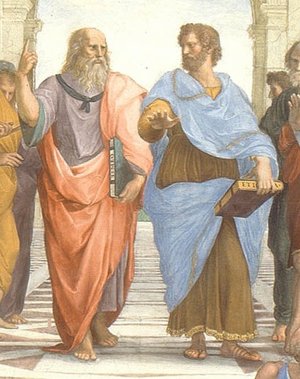
Regarding an Open Dialogue: Inherent Elitism and the Tension between Politics and Philosophy
Introduction: Politics and Philosophy as Opposites


I want to write about two things that link to a post that I wrote last week. Firstly, I think I was wrong about the open-ended dialogue due to an inherent elitism that is part of this notion. And secondly, I think this tension is caused by politics and philosophy being polar opposites. Let me explain. I am busy reading Martha Nussbaum’s Therapy of Desire. Whilst discussing some of the virtues of Aristotelian open-dialogue and a discussion based on rationality, she also states that this way of thinking is necessarily exclusionary and elitist. There is an enormous amount of luck involved here. If you are born into the right family; into the right era; into the right class; etc, then you might have the opportunity to have an open dialogue based on rationality and others might enter this open dialogue with you. But again, this is only available to a handful, a few that was born into the right circumstances. So, in fact, what I called open dialogue last week might look like an open dialogue, however, it is inherently elitist. This is also the problem with philosophy (and why politics and philosophy never sit around the same campfire). Philosophy is involved with the rational and abstract, locked up in the ivory tower; politics are involved in the irrational and the concrete, busy in the streets or in the agora (or marketplace).
The Inherent Elitism of an Open Dialogue
Who can enter the open dialogue? Everyone right? Not actually. It is only when you fulfil xyz requirements that you can enter this dialogue, but also you need to be from xyz background. In Nussbaum (2018), Aristotle is said to have only opened his school for certain people of certain backgrounds. If you were female, or if you were a farmer, then unfortunately you could not enter his school, neither could you enter the open dialogue based on rationality. Isn’t this then a contradiction in terms? It is open, but only to a certain few? Isn’t this still the case today? If you did not go to university and did not do all the laborious philosophy classes and seminars, then you cannot be part of the open dialogue. But this is not the idea I want to present though. A truly open dialogue would not exclude any voice that can speak up. The second problem then, as mentioned and briefly touched upon, is that philosophy does not like to get mixed up in the concrete and particulars. It wants to be part of the sciences and wants to remain clean.
Concrete Politics and Abstract Philosophy


In a lot of my posts, I try and conceptualize what philosophizing might be. Most of these conceptualizations are predominantly abstract and focuses on things that might be out of reach for the everyday person struggling with concrete problems. Let us state that politics are part of this messy concrete which is called everyday life. Why does philosophy stay out of this and remain in the ivory tower? Let us, provisionally, claim that this is due to philosophy losing touch with its roots. This post will not venture to answer this problem head on, neither do I have the time for a lengthy exposition.
Simply put, Socrates walked the agora (marketplace) and questioned people about their everyday beliefs and understanding of concepts. This is a messy and laborious activity. Since the Greeks handed philosophy to the world, scholars have focused on what others have said through texts and not the spoken word. Socrates never wrote anything, because he knows this is one of the firsts steps to corrupt thoughts. This is a political act, and not a philosophical one. It is a revolt against the pen, against the abstraction of thoughts. He remains in the concrete, in the political space between the fellow Athenians. Professors of philosophy today remain in the ivory tower, too busy trying to understand what others have said and not interested in the everyday person’s struggles with everyday life and problems. Can philosophy become political? Can philosophy get out of the ivory tower and listen to those who are not philosophically inclined?
Opening Philosophy to the Everyday Person
In order to get philosophy out of the ivory tower, we need to politicize it. Let us go back to the open dialogue idea. For whom is it open? This is the right question to ask in order to start politicizing philosophy. For whom? For whom? For whom is philosophy and the philosophical life possible? My next-door neighbour might benefit from the open dialogue because he or she got stuck in believing things which might be harmful. But proposing that the open philosophical and rational dialogue might be a worthwhile exercise to someone from African or Eastern culture is to commit the sin of thinking that the Western perspective is the correct path. This is exactly where the problem resides: Rational and open dialogues are what the Western philosopher thinks leads to the truth, or whatever the end might be. But for the dialogue to be truly open, it needs to problematize its own position, it needs to become self-aware. It needs to become political and see itself as one amongst many and not the only one. When philosophy becomes aware of itself, when it becomes politicized, then one might start to open the dialogue so that everyone might enter.
Further Reading
Nussbaum, M.C. 2018. Therapy of Desire. Princeton: Princeton University Press.









Comments